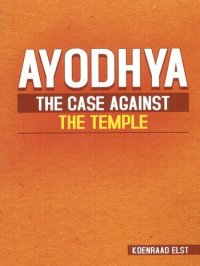
Ebook: Ayodhya: The Case Against the Temple (Kindle)
Author: Koenraad Elst
- Genre: History
- Tags: Hinduism
- Year: 2002
- Publisher: Voice of India
- Edition: 1
- Language: English
- mobi
The present book is my last contribution to the literature on what is known in India as 'communalism', meaning the conflict between the different religions, principally Hinduism and Islam. My first book in this sphere of interest was Ram Janmabhoomi vs. Babri Masjid: A Case Study in Hindu-Muslim Conflict (1990). It served a good purpose, viz. to break the false impression that the world of scholarship including Western Indologists was united in certifying that the Hindu claim to the disputed site in Ayodhya was historically unfounded. In the subsequent years, evidence has been piling up in favour of the Hindu claim. Corning full circle, I have included in this book a compilation of papers on various aspects of the Ayodhya debate written by me between 1995 and 2002. Its main focus is the argumentation and view of Hindu-Muslim history offered by the anti-temple party. In references to the question whether there really was a Hindu temple at the Ayodhya site later covered by the Babri Masjid, the focus is invariably on the case made by the Hindu side, viz. that there was a temple, and that different types of evidence confirm this. The standard question is: is this evidence for the temple demolition scenario valid? Have they succeeded in proving the existence of the temple? By contrast, the opponents of the temple hypothesis are but very rarely asked to put their evidence on the table. The non-temple argumentation is confined to two types of evidence: arguments from silence, and attempts to find fault with pieces of evidence offered by the temple party. Criticism of the pro-temple argument is usually directed against a straw man, not against the actual argumentation as presented by pro-temple scholars. A number of much-acclaimed anti-temple publications bravely announce in the introduction or on the cover that they will demolish every argument given (or 'concocted' and 'maliciously propagated') by the temple party, but then fail to address or even mention the main...
Table of Contents:-
Foreword
1. The Ayodhya Debate: Focus on the "No Temple" Evidence
2. Ashoka and Pushyamitra, Iconoclasts?
3. The Bodh Gaya Temple Controversy
4. Harsha of Kashmir, a Hindu Iconoclast?
5. Vandalism Sanctified by Scripture
6. The Details About "Hindu Iconoclasm"
7. Why Did Aurangzeb Demolish the Kashi Vishvanath Temple?
8. From Ayodhya to Nazareth
9. Ayodhya and the Supreme Court
10. Mohammed Habib's History-Rewriting
11. The Ayodhya Evidence Debate
12. About the Hindu Critique of Monotheism
13. Postscript: A Lasting Solution
Bibliography
Table of Contents:-
Foreword
1. The Ayodhya Debate: Focus on the "No Temple" Evidence
2. Ashoka and Pushyamitra, Iconoclasts?
3. The Bodh Gaya Temple Controversy
4. Harsha of Kashmir, a Hindu Iconoclast?
5. Vandalism Sanctified by Scripture
6. The Details About "Hindu Iconoclasm"
7. Why Did Aurangzeb Demolish the Kashi Vishvanath Temple?
8. From Ayodhya to Nazareth
9. Ayodhya and the Supreme Court
10. Mohammed Habib's History-Rewriting
11. The Ayodhya Evidence Debate
12. About the Hindu Critique of Monotheism
13. Postscript: A Lasting Solution
Bibliography
Download the book Ayodhya: The Case Against the Temple (Kindle) for free or read online
Continue reading on any device:

Last viewed books
Related books
{related-news}
Comments (0)